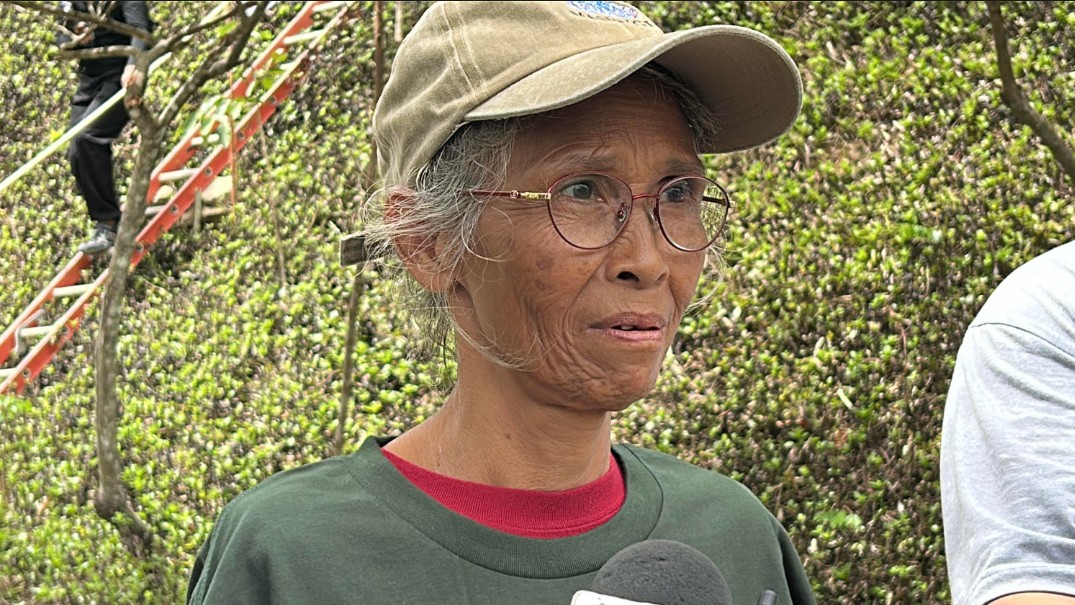For a Dumagat, saving Masungi means saving their tribe

Over a hundred volunteers and environmental advocates gathered at the Masungi Georeserve on Tuesday to protest the Department of Environment and Natural Resources (DENR) eviction notice.
Among those standing in solidarity with the conservation site were members of the indigenous Dumagat tribe, who fear the loss of their ancestral home and way of life should the eviction push through.
Nelly dela Carzada, a member of the Dumagat from Daraitan, Tanay in Rizal, told reporters during the Masungi Nature Defense Camp that life in the mountains is what sustains their tribe.
“Ang buhay namin naka-ano dyan sa kalikasan. Kumbaga, bahay namin yan, kaming mga tribo, ang kalikasan. Kaya sumusuporta kami sa Masungi dahil wala nang matitira na kalikasan, wala tayong tinatayuan ng mga project kaya masakit din sa aming mga tribo na wala na kaming makikitang bundok. Kaya sumusuporta kami sa Masungi hanggang ngayon.”
(Our lives are tied to nature. It is our home, our tribe’s home. That is why we support Masungi— because if nature is gone, there will be nothing left. There will be no place for projects, and it pains us as a tribe to see that there will be no mountains left. That’s why we continue to stand with Masungi.)
For the Dumagat, eviction from Masungi is not just about displacement; it threatens their very survival.
She stressed that nature is not just a resource—it is their home. Their tribe relies on the mountains for shelter, water, food, and medicine.
“Alam mo, buhay namin yan kaya mawawala na rin ang tribo. Wala kaming titirhan. Hindi kami sanay sa sinasabing kabayanan. Hindi namin alam ang buhay doon. Ang buhay talaga namin sa bundok, kaya namin mabuhay doon, marami doong libre. Tubig libre, pagkain, sa mga gamot namin, hindi namin binibili.”
(You see, this is our life, and if we are forced to leave, our tribe will disappear. We will have nowhere to go. We are not used to living in the lowlands, in what they call towns. We don’t know how to live there. Our life is in the mountains—that’s where we can survive. Many things are free: water is free, food is free, even our medicines—we don’t have to buy them.)
Dela Carzada also expressed frustration that not all indigenous members support their cause.
She highlighted the critical role of forests in mitigating climate change, recalling a time when the environment was healthier.
Not just the Dumagat at risk
“‘Di ba usong-uso na ‘yang climate change? ‘Di ba sobrang init? Noong panahong hindi pa sirang-sira yan, syempre may edad na ako, ang sarap ng buhay namin. Hindi kami nakakaranas ng mainit. Ay kung mawala pa yan, mawawalan na ang mga tao. Hindi lang Dumagat, kayo rin. ‘Di ba mainit na, iba na ang panahon. Sobrang init. Ay sa mga kalamidad na dumadating tulad ng mga bagyo, siya ang sumasanga dyan, ‘yung kabundukan. Ay kung walang bundok? Anong mangyayari?”
(Climate change is everywhere now. It’s extremely hot. Back when everything was not so destroyed— well, I’ve been around long enough to know—life was good. We didn’t experience this kind of heat. But if this place is destroyed, people will suffer. Not just the Dumagat, but all of you as well. The climate is changing, it’s unbearably hot now. And during disasters like typhoons, the mountains serve as protection. If there are no mountains, what will happen?)
The Dumagat tribe has been living in the forested area since the 1980s, when they witnessed the rampant illegal logging before Masungi stepped in to restore the decimated land.
They believe that losing Masungi would not only displace their community but also accelerate environmental destruction, worsening issues like climate change and natural disasters.
“Nung panahong ‘80s? Nandito na kami, kapitbahay namin ‘yan. Nung panahong ‘yun walang hanapbuhay. Usong-uso n’on yung illegal logging. Pag may nanghuhuli, ang mahuhuli, diyan sila dumadaan, medyo liblib yan. May kalsada dyan eh, pababa. Kaya ginawa nilang taguan yan nung mga illegal—‘yung mga kahoy ba. Kaya buti dumating nga ang Masungi. Dati yan kalbo na. Nung dumating sila, gumanda.”
(We’ve been here since the 1980s. Masungi was our neighbor. Back then, there were no jobs, and illegal logging was everywhere. When authorities cracked down on loggers, they would use the area to hide because it was so remote. There was even a road going down where they smuggled the logs. It was fortunate that Masungi arrived. That place used to be barren. After they arrived, the land flourished.)
The protest took place on the day the DENR’s 15-day eviction order reached its deadline, placing Masungi Georeserve in a precarious situation.
Advocates continue to call for the preservation of the conservation site, urging the government to recognize its ecological importance and the communities that depend on it.
Masungi is located on the upper reaches of a watershed that directly impacts the 20 million people of Metro Manila. The ecosystem it supports extends from the cities of Marikina and Pasig to Manila Bay, influencing water security, disaster resilience, and even economic stability. —RF, GMA Integrated News




